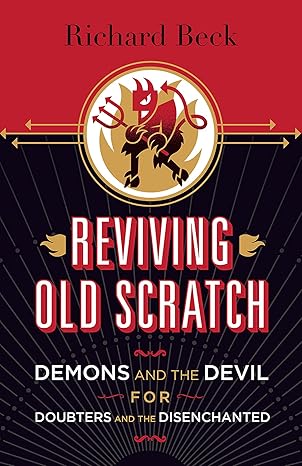This Tuesday, we are discussing Chapter 11, “Angels and Demons,” and Chapter 12, “Resist the Devil,” of Richard Beck’s book Reviving Old Scratch: Demons and the Devil for Doubters and the Disenchanted.
The Banality of Evil: (pp.103-05)
Beck opens this chapter with a discussion of how true evil can be boring and ordinary, using the example of Adolf Eichmann. In Nazi Germany, Eichmann was placed in charge of expelling all Jews from Germany. When expulsion became impractical because of the War, Eichmann organized the mass deportation of Jews to the death camps set up in occupied Poland and helped to make those camps more efficient. After the War, Eichmann escaped to Argentina, where he was arrested by the Mossad on May 11, 1960, and put on trial from April to August 1961 in Israel. One of the primary defenses raised by Eichmann was that he was just following orders and doing his job, no different than anyone else who shows up for work at 9 A.M every Monday morning.
A Jewish German-American philosopher named Hannah Arendt covered the trial for The New Yorker Magazine. She wanted to look into the eyes of the monster who orchestrated the Jewish Holocaust. What she found, however, was that “The deeds were monstrous, but the doer . . . was quite ordinary, commonplace, and neither demonic nor monstrous.” He was simply an ordinary man who was superficial, mediocre, and incapable of independent critical thinking, relying on patriotic cliches and trying to please his superiors. More of a clown than a monster. She writes that he committed evil deeds without malicious intentions, but rather for career advancement. He was, in her words, “terrifyingly normal.” In response to her observation, she coined the term “the banality of evil.” Her New Yorker articles can be found HERE and HERE.
The Zeitgeist: (pp.105-08)
Zeitgeist is a German word (Zeit meaning time and Geist meaning spirit or ghost) that refers to the prevailing intellectual, moral, and cultural climate of a particular time and place. Consider the difference between the Zeitgeist of the late 1960s (drugs good, capitalism bad) and the Zeitgeist of the mid-1980s (drugs bad, capitalism good). The Zeitgeist is the cultural water in which we all swim. The problem, as Beck diagnoses it, is how to discern whether we are following the Holy Spirit or the Spirit of the Times. p.105. We can more easily see the evil Zeitgeist of prior times. Eichmann was not an evil person but was caught up in the Nazi Zeitgeist and therefore did evil things. If we look at race relations in America from a Christian defense of chattel slavery (even a Connecticut Yankee like Jonathan Edwards defended the practice) to a defense of Jim Crow, we can more clearly see the Spirit of the Times and how it permeates every person and every institution, including the church.
As Beck points out, the problem with the Zeitgeist is that it cannot be resolved merely by passing a law. While the law can make it illegal to discriminate based on race, it cannot change hearts and minds to view all races equally. Public policy can only take us so far because the root of the evil and the battle to be fought is spiritual.
The Gods of this World: (pp. 108-114)
Beck delves deeply into Psalm 82. The Psalmist presumes the existence of other deities within the cosmos, and these lesser gods or spirits are said to adjudicate unjustly and display partiality toward the wicked. It is God who calls these lesser spirits to repentance. As Beck points out, the Psalm presupposes that a nation’s spirituality is intertwined with the political and economic oppression prevailing within that nation. p.111. Political power is gained through spiritual allegiance to these lesser and oppressive gods. p.113. Therefore, spiritual warfare is not about battling political policies but rather about contending with the Spirit of the Times.
Discerning the Spirits: (pp.114-117)
Beck concludes this chapter with the observation that each of us is blinded by the Zeitgeist of our own time and place. He asks, how can we “test and discern the spirits in our own contexts and in our own hearts and minds?” p.115. One approach to discerning the Zeitgeist of our time, country, or church is to employ an inside/outside metaphor for the spiritual and physical realms. What is the inside culture of our country, churches, or other organizations, and is that culture in accordance with what we see in Jesus? Beck believes that we do have the power to discern the spirits and whether those spirits are of God or otherwise. The question we will discuss on Tuesday is how to identify the Spirit of the Times in our own lives and institutions.
SCHEDULE: We are not meeting on Tuesday, June 24. That evening, at 5:30, Bishop Ruth is holding a Deanery meeting at St. Anne’s in Conway to discuss the strategic vision of the Diocese. Everyone is welcome to attend this meeting and take part in the conversation.
Dinner is at 6. The menu is tacos. Discussion about 6:45. Compline at 8. Hope to see you here!
See to it that no one makes a prey of you by philosophy and empty deceit, according to human tradition, according to the elemental spirits of the universe, and not according to Christ. Colossians 2:8

